Africa’s EdTech sector is booming, fueled by a growing youth population, rising education spending, and increased smartphone usage. By 2030, education spending is projected to triple to $740 billion, and EdTech investments could grow 19x to $57 billion. Key trends like mobile-first solutions, AI-driven learning, and multilingual content are shaping the future of education across the continent.
Here are 8 key investors transforming African EdTech:
- Ingressive Capital: Invests $50K–$500K in early-stage startups like Klas, focusing on scalable, tech-enabled solutions.
- EdVentures: Offers equity-free funding up to $60K, supporting startups like Nafham and Career 180 in MENA and Africa.
- Ventures Platform: Backs pre-seed to Series A startups with a data-driven approach, emphasizing accessibility and scalability.
- TLcom Capital: Invests $1M–$3M in mobile-first solutions, with success stories like uLesson.
- Proparco: Provides €0.5M–€5M for startups like Moringa School, focusing on skills development and regional growth.
- DOB Equity: Focuses on East Africa, supporting ventures like Zydii and Moringa School with tailored financing.
- Future Africa: Invests $100K–$500K in early-stage startups like Foondamate and STEM Cafe, using a TD3 evaluation framework.
- Microtraction: Offers $100K for 7% equity at pre-seed stages, supporting platforms like Gradely.
Quick Comparison
| Investor | Investment Size | Focus Areas | Notable Investments |
|---|---|---|---|
| Ingressive Capital | $50K–$500K | Scalable tech startups | Klas |
| EdVentures | Up to $60K (equity-free) | MENA & Africa EdTech | Nafham, Career 180 |
| Ventures Platform | Pre-seed to Series A | Accessibility, scalability | Multiple startups |
| TLcom Capital | $1M–$3M | Mobile-first solutions | uLesson |
| Proparco | €0.5M–€5M | Skills development | Moringa School |
| DOB Equity | Tailored financing | East Africa EdTech | Zydii, Moringa School |
| Future Africa | $100K–$500K | Early-stage, TD3 framework | Foondamate, STEM Cafe |
| Microtraction | $100K for 7% equity | Pre-seed startups | Gradely |
These investors are not just funding startups – they’re shaping the future of education in Africa by addressing critical challenges like literacy, workforce skills, and access to quality education.
How to Raise Funds for an EdTech Startup
1. Ingressive Capital
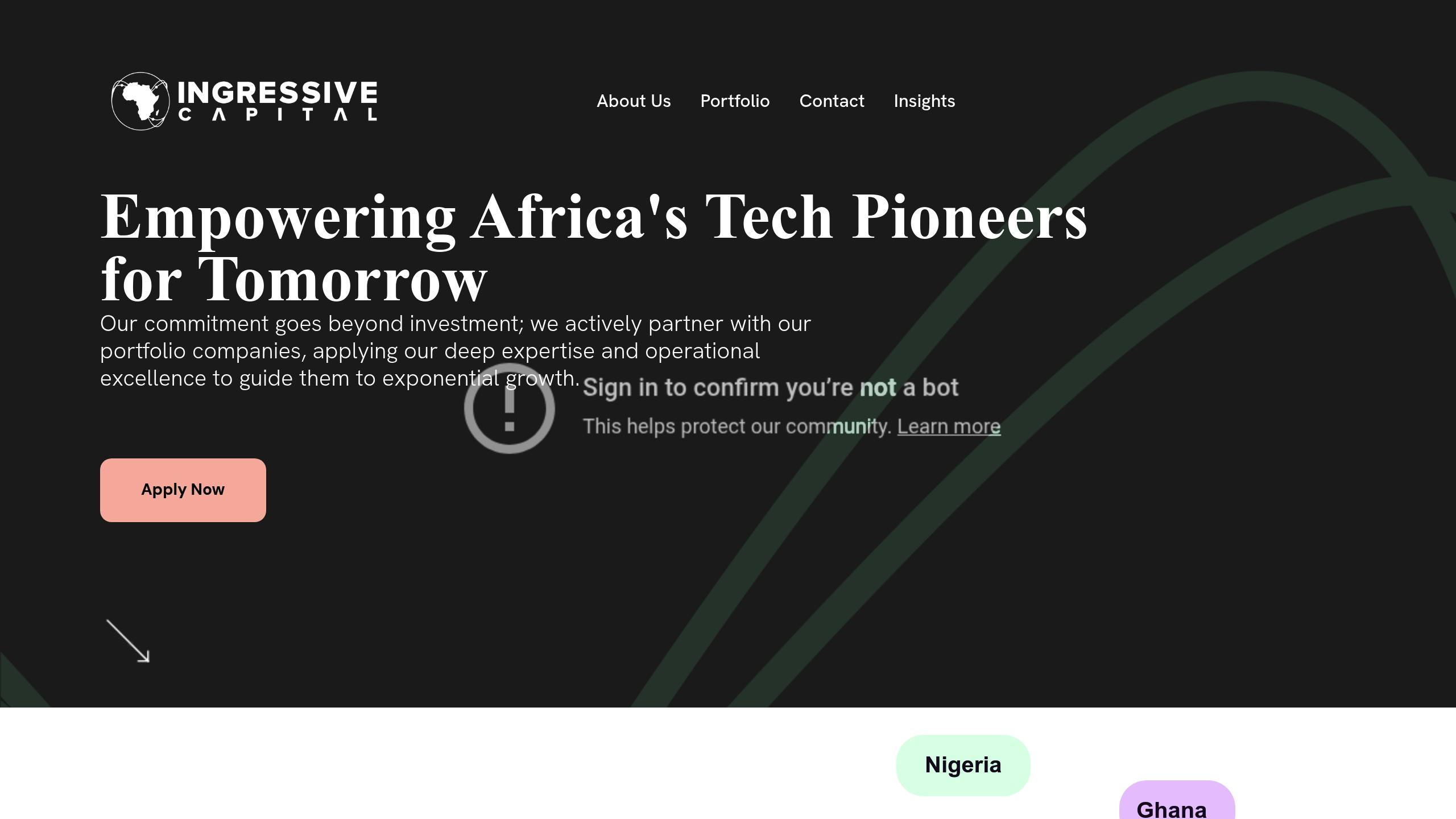
Ingressive Capital, based in Lagos, is an early-stage venture capital firm managing a $50 million fund. They typically invest between $50,000 and $500,000 in exchange for around 10% ownership in pre-seed and seed-stage startups. Their focus? Backing tech-enabled startups that address local challenges while having the potential to scale globally. In EdTech, this means supporting platforms that tap into Africa’s booming digital economy, which is expected to hit $180 billion by 2025.
“Our mission is to identify, invest in and support the scale of pre-seed, high-growth Pan-African tech startups that focus on disruptive innovation and bolster our pursuit of our broader purpose.” – Ingressive Capital
One standout example is Klas, a Nigerian educational platform experiencing rapid growth. In February 2024, Ingressive Capital led a $1 million funding round for Klas, which now connects 5,000 teachers with 300,000 learners across 30 countries. The platform offers a range of features designed for modern education:
| Feature | Functionality |
|---|---|
| Live Classes | Interactive, real-time learning sessions |
| Recorded Content | On-demand educational videos and materials |
| Digital Resources | Ebooks and other downloadable learning tools |
| Multi-Currency Support | Payment options across different regions |
| Scheduling Tools | Tools for organizing and managing classes |
Ingressive Capital doesn’t just provide funding. They offer hands-on support, including strategic advice, mentorship, access to industry experts, client introductions, and opportunities for institutional partnerships. The firm is also committed to diversity and local ownership – 40% of the companies in their Fund I portfolio have female co-founders, and all maintain indigenous equity ownership.
Their investments span several key African markets, including Egypt, Ghana, Kenya, Morocco, and Nigeria. This broad reach allows them to support EdTech solutions tailored to various educational needs and market demands. Next, we’ll take a look at how EdVentures is driving further progress in African EdTech.
2. EdVentures
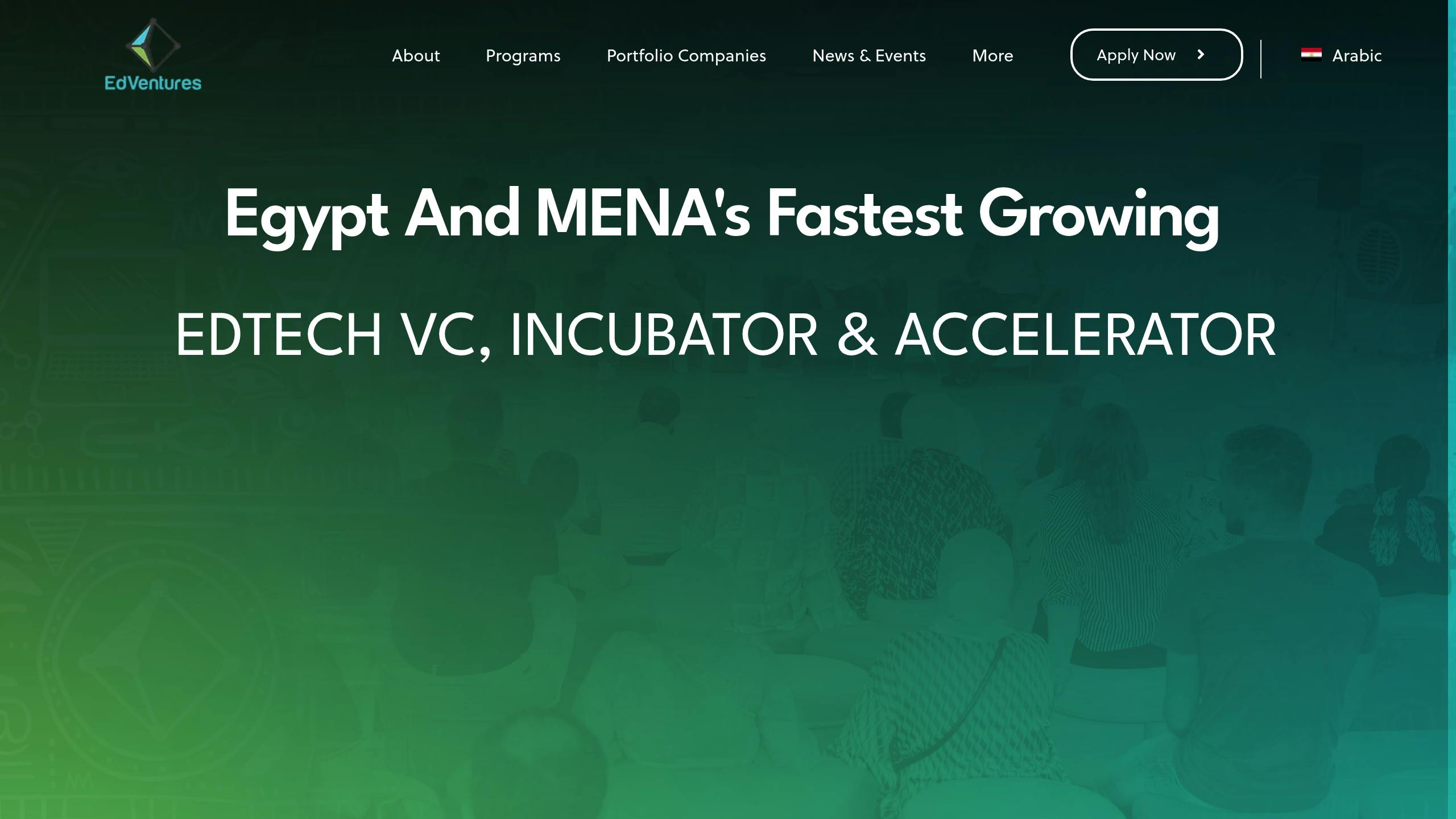
EdVentures, the venture capital arm of Nahdet Misr Group, focuses on the EdTech sector across Africa, including key markets in the MENA region. Since its inception in 2017, EdVentures has supported over 95 startups and directly invested in 24 of them as of February 2025. This record highlights their targeted approach to funding and nurturing EdTech startups.
Their strategy combines financial investment with incubation support. They primarily back startups with valuations around $1 million, targeting solutions that bring measurable improvements to the education sector.
Portfolio Highlights
EdVentures’ portfolio spans various EdTech segments, showcasing diverse solutions:
| Segment | Portfolio Companies | Focus Area |
|---|---|---|
| Online Learning | Nafham by Tayro | Digital curriculum platform |
| STEM Education | ArmStrong, Techy App | Interactive science and tech learning |
| Professional Skills | The Copywriter, Career 180 | Career development and creative education |
| Special Education | Deaf Gain, Maharet Tefl | Accessibility solutions |
| Language Learning | OTO Courses | English language education |
| Transportation | SchoolZ | Student commute solutions |
Mastercard Foundation EdTech Fellowship Impact
The results from the Mastercard Foundation EdTech Fellowship underline the program’s impact:
- 147,200 learners reached (30% growth)
- Women accounted for 61.5% of learners
- 56% employment growth in supported startups
- 6,550 learners with disabilities gained access to education
“We are incredibly proud of the Mastercard Foundation EdTech Fellowship and the outstanding results achieved by our first cohort of startups. In just ten months, we have seen significant growth in EdTech adoption, youth empowerment, and job creation. These impressive milestones reaffirm our commitment to nurturing innovation in education and providing meaningful support to promising entrepreneurs in the sector.” – Dalia Ibrahim, CEO of EdVentures
Funding and Support
EdVentures sets itself apart with its specialized focus on EdTech and its support programs. It offers up to $60,000 in equity-free funding, alongside operational assistance for market expansion, product development, and access to Digital Egypt Centers services.
In 2024, EdVentures further expanded its portfolio by investing in eight new Egyptian EdTech startups, including:
- Elkheta: A tutoring platform
- Saikoro: Digital educational content provider
- InvestED: An educational fundraising solution
These investments highlight EdVentures’ dedication to addressing critical challenges in education across Africa.
3. Ventures Platform
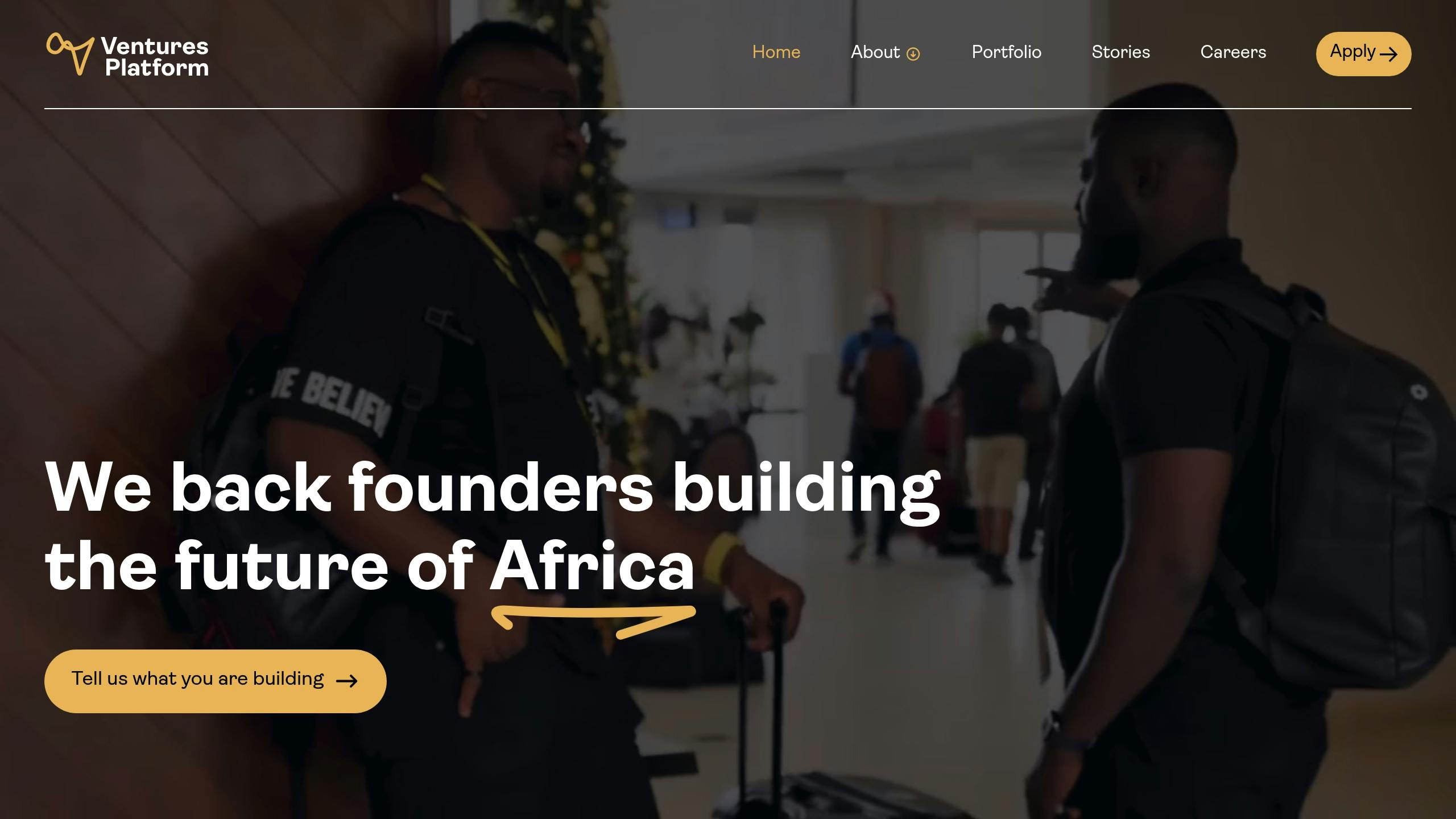
Ventures Platform (VP) is a discovery fund that invests in early-stage African startups, with a focus on EdTech solutions that address gaps in infrastructure and tackle barriers to education access.
Investment Strategy
VP uses a data-driven approach to evaluate opportunities. Every month, they review 150 to 350 deals, closely analyze 4–10 of them, and ultimately invest in about one company. This process ensures they back the most promising EdTech ventures.
Their investment criteria include:
- Market Impact: Solutions that make education more accessible.
- Infrastructure Development: Platforms addressing fundamental gaps in education.
- Scalability: Businesses with the potential to grow and reach larger markets.
- Innovation: Technologies that break down barriers to education.
Portfolio Performance
VP’s strategy has delivered strong results:
| Metric | Achievement |
|---|---|
| Active Investments | 60+ companies |
| Follow-on Funding | Over $1 billion raised |
| Investment Stages | Pre-seed to Series A |
| Monthly Deal Flow | 150–350 opportunities |
| Investment Rate | ~1 company per month |
Support Framework
In addition to funding, Ventures Platform offers portfolio companies a “platform and networks” practice. This support is especially helpful for EdTech startups navigating Africa’s challenging education market.
“We invest in companies that solve for non-consumption, plug infrastructural gaps and democratise prosperity in Africa, by eliminating the barriers to access and reducing the costs of delivering goods and services.”
– Ventures Platform
VP’s dedication to EdTech is bolstered by support from both local and global investors. Kola Aina, Founder and General Partner at Ventures Platform, notes, “We are honored to have the breadth of both local and global investors who have bought into our vision and who equally are bringing immense value to our portfolio”.
This strong backing highlights VP’s role in reshaping African EdTech and driving progress in the continent’s education sector.
4. TLcom Capital
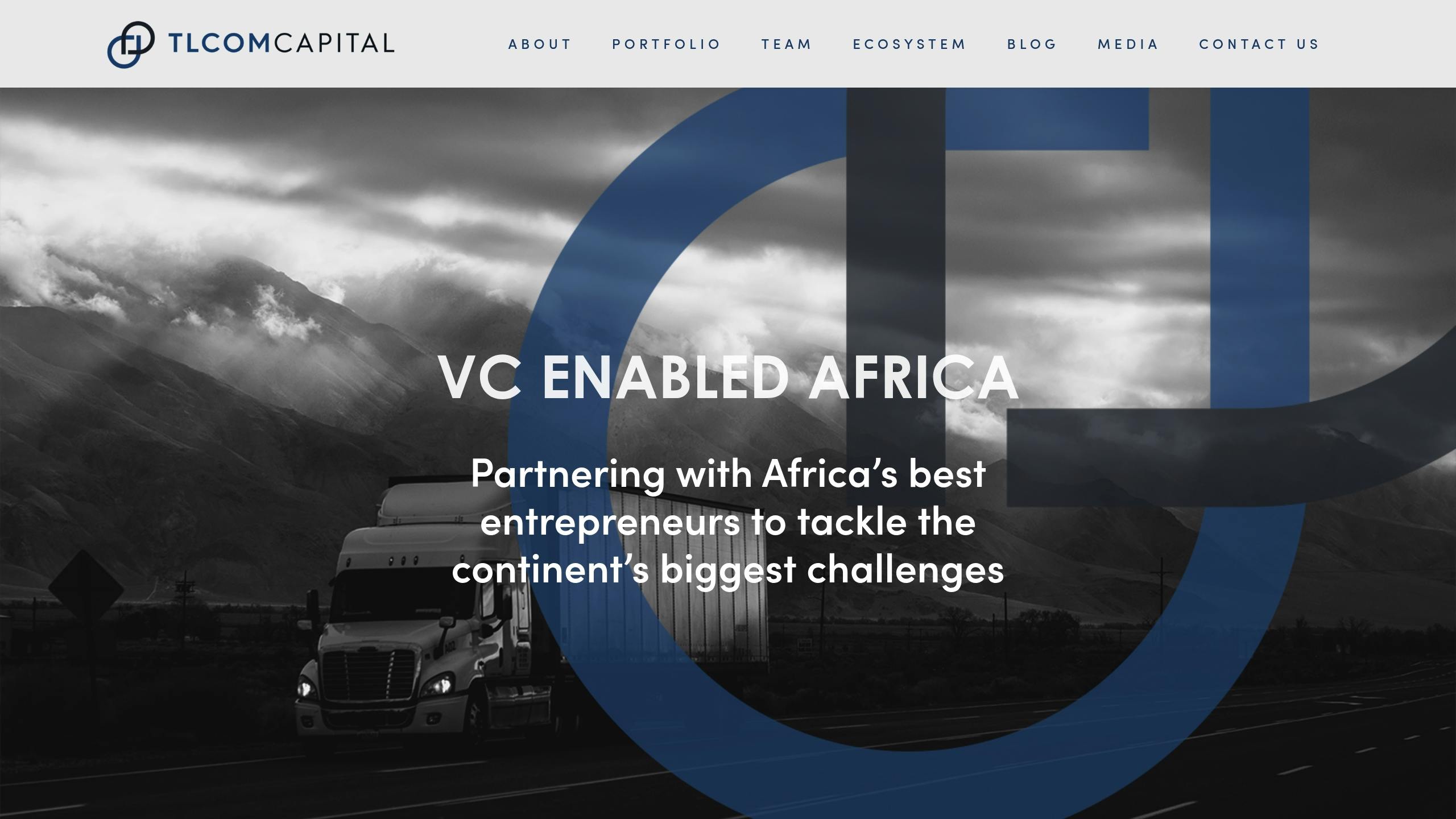
Managing over $300 million in assets, TLcom Capital supports African EdTech ventures by offering funding and hands-on guidance. This approach positions the firm as an active partner for startups tackling local educational challenges.
Investment Strategy
TLcom focuses on early to growth-stage companies, typically investing between $1 million and $3 million in initial rounds. Alongside funding, they provide strategic, operational, and financial guidance.
| Investment Focus | Details |
|---|---|
| Stage | Seed to Series A (over 80% of investments) |
| Initial Investment | $1M – $3M |
| Market Focus | Mobile-first solutions |
| Target Sectors | Education, Financial Services, Health, Energy |
| Key Criteria | Product-market fit, Commercial traction, Scalability |
“We back entrepreneurs who understand local challenges and build solutions from the ground up.” – TLcom Capital LLP
This approach has led to successful partnerships, such as their involvement with uLesson.
Notable Investment Success
TLcom’s backing of uLesson showcases its commitment to scalable, locally-driven EdTech solutions. In December 2021, uLesson raised $15 million in a Series B funding round, with TLcom Capital joining other investors like Tencent, Nielsen Ventures, Owl Ventures, and Founder Collective. The platform offers:
- Pre-recorded educational videos for K-12 students
- Interactive quizzes
- Homework tools through its mobile app
Strategic Support Framework
Andreata Muforo leads TLcom’s efforts in providing comprehensive support to startups.
“TLcom Capital supports Africa start-ups and scale ups by providing capital as part of a larger support to the entrepreneur which is centered on strategic, operational and financial mentoring for value generation.” – Andreata Muforo, Partner at TLcom Capital
This strategy has helped TLcom establish a strong presence in the dynamic African market.
Investment Philosophy
TLcom’s TIDE Africa Fund drives its mission to back companies using mobile technology to address Africa’s unique challenges. They prioritize entrepreneurs who:
- Understand local educational needs
- Offer solutions tailored to African contexts
- Show potential for rapid growth
- Operate efficiently
- Achieve strong product-market fit
With a portfolio of 17 startups, TLcom Capital has cemented its role as a key player in advancing education through technology in Africa.
sbb-itb-dd089af
5. Proparco
Proparco has established itself as a key player in advancing EdTech across Africa. By combining financial investments with long-term support, Proparco aims to strengthen the continent’s educational technology sector while promoting economic growth.
Investment Strategy and Focus
Proparco’s approach to investing in African EdTech is guided by specific criteria:
| Investment Criteria | Details |
|---|---|
| Investment Range | €0.5M – €5M ($0.54M – $5.4M) in direct investments |
| Fund Investments | €5M – €15M ($5.4M – $16.1M) in seed/VC funds |
| Revenue Requirement | Minimum €400K ($430K) annual revenue |
| Geographic Focus | Core business must operate in Africa |
| Target Sectors | EdTech, FinTech, HealthTech, AgTech, CleanTech |
Spotlight on Moringa School
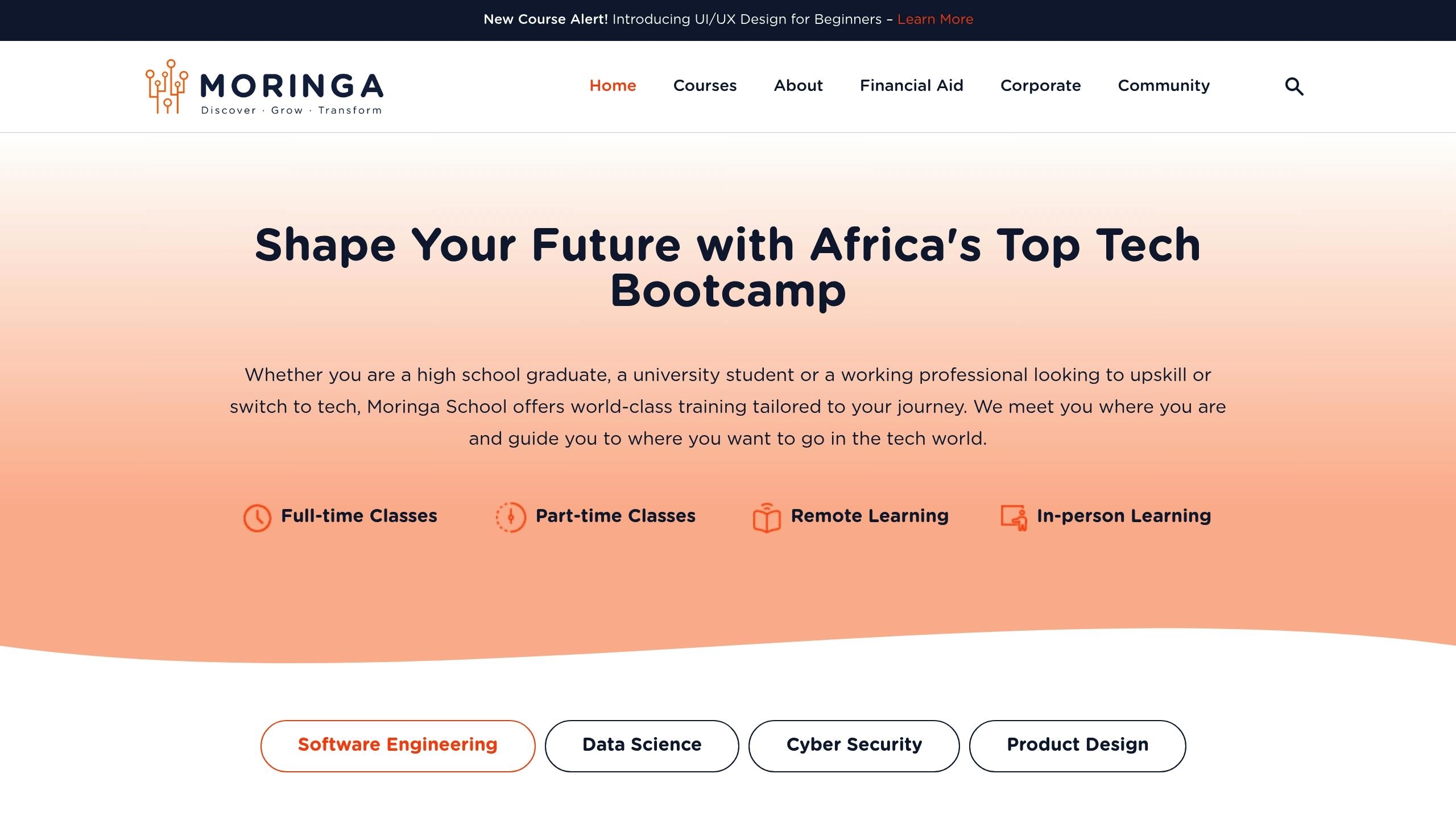
In June 2022, Proparco made a pre-Series A investment in Moringa School, enabling the institution to expand into Ghana and Nigeria while diversifying its course offerings. Moringa School provides training in Software Engineering, Data Science, and Soft Skills, with plans to add UI/UX design programs. To date, the school has trained over 4,000 students, boasting an 85% employment rate.
A Strategic Approach to Growth
Proparco’s 2023–2027 strategy focuses on backing startups with strong leadership, regional growth potential, and solutions that address critical skills shortages.
“Supporting the African tech ecosystem is one of Proparco’s key priorities. Through our investment in Moringa, Proparco is proud to support an ambitious edtech in its expansion in Africa and thus contribute to bridging the skills gap that has been affecting the growth of startups on the African continent” – Françoise Lombard, Proparco’s CEO
Expanding the Investment Portfolio
Since 2018, Proparco has invested in over 200 African tech startups. Its support extends beyond funding, offering technical assistance, management training, consulting services, and specialized financing options. This comprehensive strategy has made Proparco a driving force in the EdTech sector, leveraging its local expertise and market knowledge to inspire confidence among other investors.
6. DOB Equity
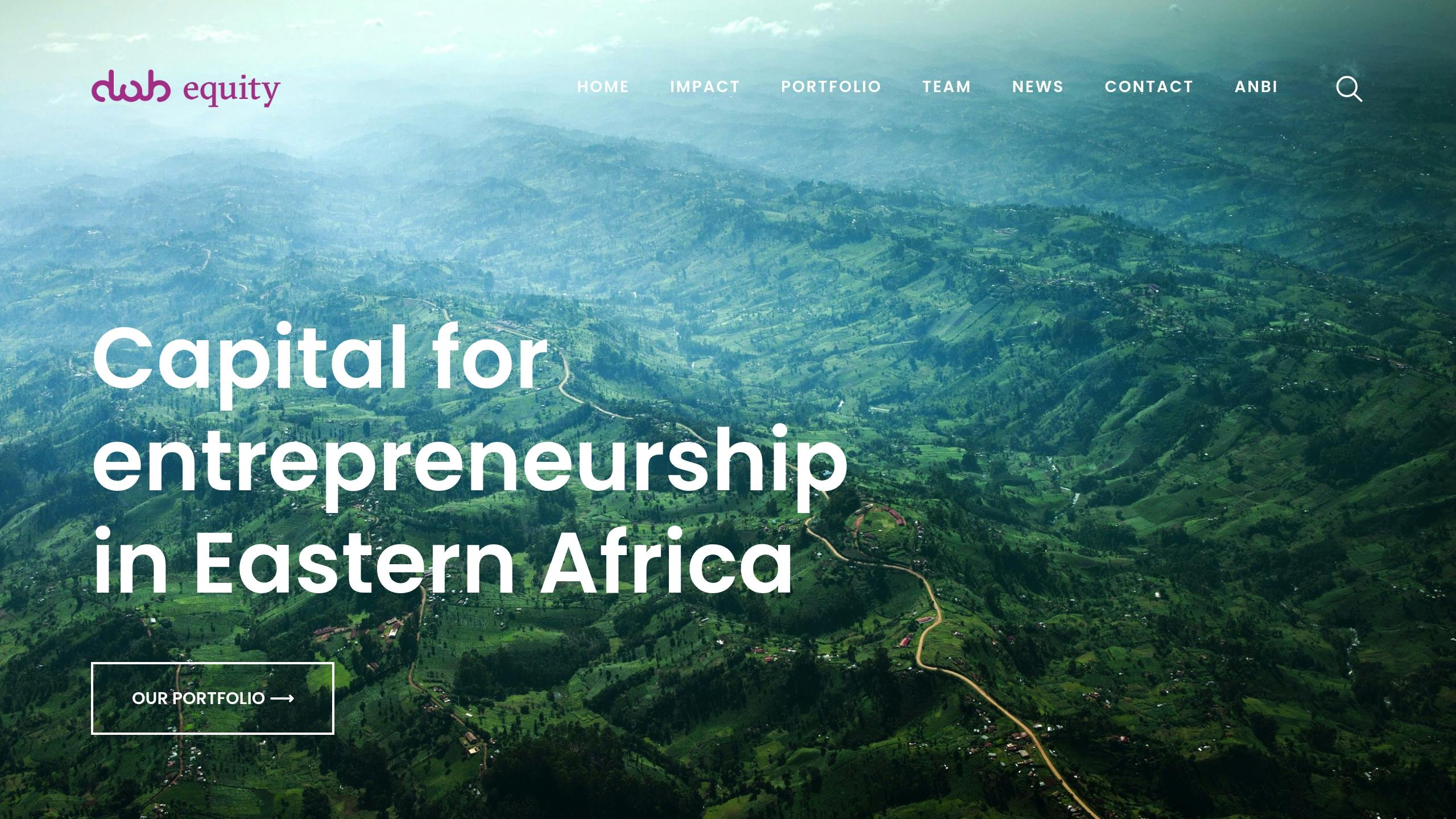
DOB Equity has made a name for itself as a key investor in East Africa’s EdTech sector, with investments totaling around $80 million (about €75 million) across 26 companies. As an evergreen fund, it focuses on long-term growth that’s both impactful and profitable.
Investment Strategy
DOB Equity’s approach to investing is guided by three main priorities:
| Focus Area | Description |
|---|---|
| Geographic Scope | Concentrates on Eastern Africa, mainly Kenya and Tanzania |
| Investment Range | Custom financing solutions tailored to meet each company’s unique needs |
| Support Services | Includes technical assistance, global network access, and governance support |
Key EdTech Investments
DOB Equity’s backing of Moringa School showcases its dedication to advancing education technology in East Africa. In May 2023, it further strengthened its EdTech portfolio by joining Zydii’s pre-seed funding round. Zydii, a Kenya-based digital training platform, aims to equip Africa’s workforce with essential skills.
Commitment to Education and Impact
Led by CEO Karen Serem Waithaka, DOB Equity prioritizes solutions that tackle pressing educational challenges in East Africa. Its focus is on creating sustainable businesses that also strengthen local communities.
“With Kenya’s high youth unemployment and lag in vocational and technical skills, there is a huge opportunity to plug this skills gap by better training tech talent to fit the growing market needs. The increasing global demand for tech talent, together with Africa’s rapidly rising youth population, makes this opportunity even more pressing.”
– Brigit van Dijk – van de Reijt, CEO of DOB Equity
More Than Just Funding
DOB Equity goes beyond providing capital. It offers extensive support in areas like governance, risk management, and social and environmental considerations. With offices in Kenya, Tanzania, and The Netherlands, the firm connects its portfolio companies to international networks and provides technical expertise. This hands-on approach is especially important in EdTech, where scaling often requires more than just financial resources.
Next, we’ll look at how Future Africa is shaping the EdTech space across the continent.
7. Future Africa
Future Africa has built on its history of active involvement by continuing to provide a well-rounded support system. The firm has invested approximately $4 million in 45 startups, which have collectively raised over $350 million in follow-on funding. These companies now have a combined valuation exceeding $1.5 billion and have created over 5,000 jobs.
Investment Philosophy and Approach
Future Africa describes itself as a “founding investor”, offering more than just financial backing to early-stage EdTech startups. Their approach is guided by a structured framework:
| Investment Criteria | Details |
|---|---|
| Check Size | $100,000 to $500,000 |
| Investment Stage | Pre-seed and seed stages |
| Evaluation Framework | TD3 (Talent, Design, Data, Distribution) |
| Support Areas | Narrative development, team building, value proposition |
| Community Size | Over 300 members |
Notable EdTech Investments
Future Africa has supported several promising EdTech ventures, including:
- Foondamate: Took part in a $2 million funding round for this WhatsApp-based learning platform.
- EDVES Suite: Invested in November 2023 to enhance a comprehensive suite of school management tools.
- Kibo School: Backed initiatives focused on next-generation digital education.
- Nexford University: Supported efforts in online higher education.
- STEM Cafe: Funded interactive STEM learning centers.
Investment Selection Process
Future Africa uses its TD3 framework to assess potential investments. They look for founders who demonstrate:
- Strong industry knowledge
- A clear mission-driven approach
- Products designed to fit market needs
- Data-driven strategies
- Well-thought-out distribution plans
This thorough evaluation process is paired with their broader support system to maximize impact.
“Our investment philosophy is inspired by the principles of African prosperity built on lessons from a decade of building and investing on the continent.” – Future Africa
Beyond Financial Support
In addition to funding, Future Africa offers coaching and access to a supportive community to help portfolio companies thrive.
8. Microtraction
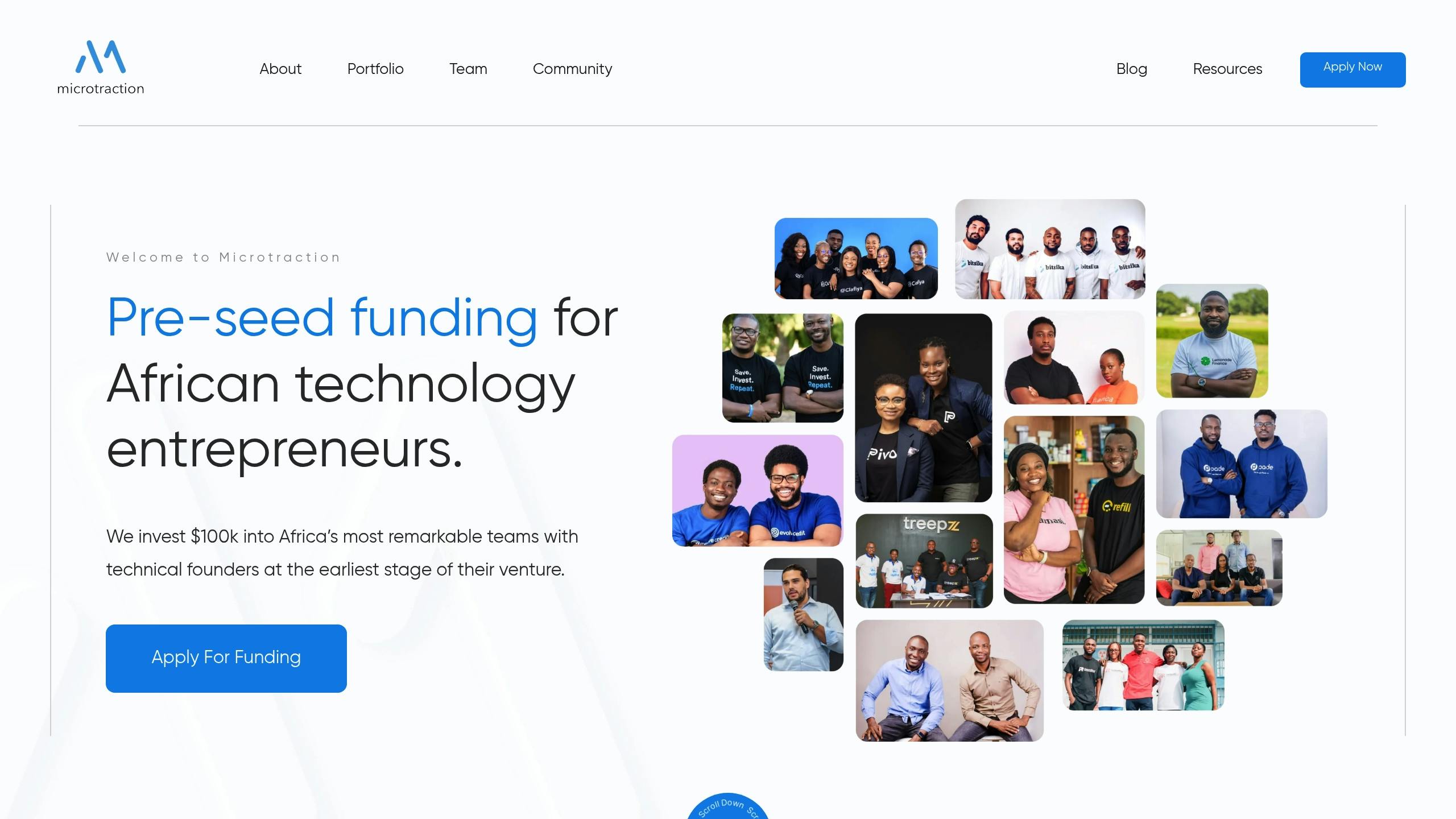
Microtraction is an early-stage venture capital firm focused on African EdTech startups. They provide initial funding of $100,000 in exchange for a 7% equity stake at the pre-seed stage, offering crucial support to founders during the earliest phases of their ventures.
Investment Strategy and Portfolio Highlights
Microtraction’s portfolio showcases impressive numbers:
| Performance Indicator | Results |
|---|---|
| Portfolio Companies | 66 companies in 8 countries |
| Total Founders Supported | 108 |
| Follow-on Funding Raised | Over $100 million |
| Combined Portfolio Value | Over $750 million |
| Standard Investment Size | $100,000 for 7% equity |
EdTech Investment: Gradely Case Study

In April 2020, Microtraction invested $25,000 in Gradely, an AI-driven educational platform. This marked their second investment in Nigeria’s EdTech sector. Gradely has since grown, providing personalized learning solutions and real-time feedback tools to nearly 70 schools.
“To achieve this mission, we are providing the tools, content and people that can support the learning process of every student. We believe that with more real-time data and feedback on the learning process, it is possible for parents and their schools to notice each individual’s learning gaps and fill those gaps in more efficient ways.”
– Boye Oshinaga, Co-founder & CEO, Gradely Technologies
Support Beyond Capital
Microtraction doesn’t just invest money; they offer a robust support system for founders. This includes access to a global network of peers, connections with top investors and experts, help in landing early customers, and introductions to additional funding opportunities.
Dayo Koleowo, a Partner at Microtraction, notes: “We’re trying to provide the same value as YC but with a better understanding of the African market, which can help a founder raise better and build more sustainable businesses”.
Building a Community-Driven Ecosystem
Microtraction is also focused on fostering a sense of community within the African startup ecosystem. They’ve developed a DAO-like platform using social tokens to encourage participation and collaboration.
“As a group, we are never shy of experimenting and creating a blueprint others can build upon. We believe that the African start-up ecosystem is still in its infancy and it’s going to take a community of connected, aligned, and incentivized members to contribute, grow and accelerate its development. As a fund & community, we look forward to continuing to innovate on Africa’s innovation infrastructure alongside our members.”
– Yele Bademosi, Founding Partner at Microtraction
Conclusion
The African EdTech sector is undergoing a major transformation, with venture capital (VC) funding playing a key role. Currently, the sector accounts for 6% of all African VC investments, signaling its growing importance in the region’s economic landscape. The data shows a market that’s evolving rapidly.
Market Growth and Investment Projections
Projections for the EdTech market reveal impressive growth potential:
| Metric | Current Value | 2030 Projection | Growth Rate |
|---|---|---|---|
| Education Spending | $224 billion | $740 billion | 14% CAGR |
| EdTech Investment | $3 billion | $57 billion | 19x increase |
| Workforce Addition | 15–20 million | – | – |
Key Areas of Focus
Investment in African EdTech is tackling major challenges in education access and quality. African governments allocate 5% of GDP to education – the highest rate globally – but private sector involvement is essential to scale impactful solutions.
Shaping the Future of EdTech
The growth of EdTech in Africa is driven by several major trends:
- Demographic Growth: Africa’s population is expected to double to 2 billion in the next 30 years, creating a huge demand for education.
- Workforce Challenges: A significant 87% of African CEOs express deep concern over the lack of workforce skills, emphasizing the need for effective training programs.
- Mobile-Centric Solutions: Partnerships between telecom companies and EdTech startups are making education more accessible and affordable.
Currently, over half of funded EdTech ventures focus on digital and STEAM education, with AI-powered platforms increasingly personalizing learning.
“Access to education should not be hindered by cost or location.”
– Matimba Mbungela, Chief Human Resources Officer at Vodacom Group
With global EdTech investments projected to hit $404 billion by 2025, Africa’s EdTech sector is positioned to drive meaningful change.
Want to stay updated with the latest tech and startup news from Africa? Join our WhatsApp channel for instant updates!
https://whatsapp.com/channel/0029Vb3xgMr42DcfICgi7T1N
Related Blog Posts
- Top 7 EdTech Startups for Digital Skills in Africa
- 10 African Tech Investors to Watch in 2025
- 5 Mobile EdTech Startups Transforming Learning in Africa
- Challenges African EdTech Startups Face in Mobile Learning
 We just launched our WhatsApp channel. Want to get the latest news from the Tech in Africa?
We just launched our WhatsApp channel. Want to get the latest news from the Tech in Africa?



